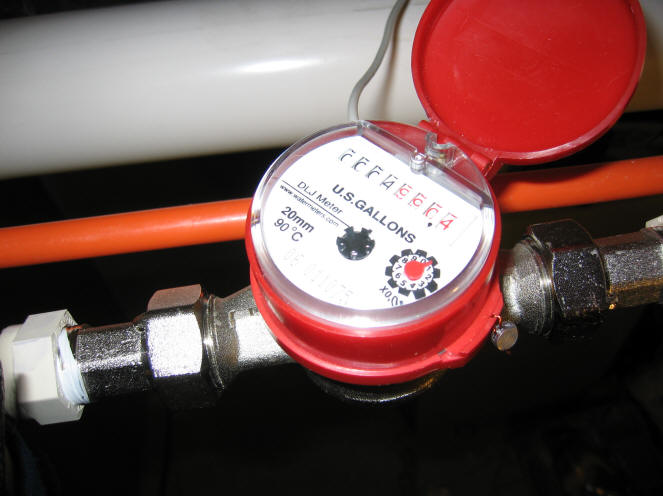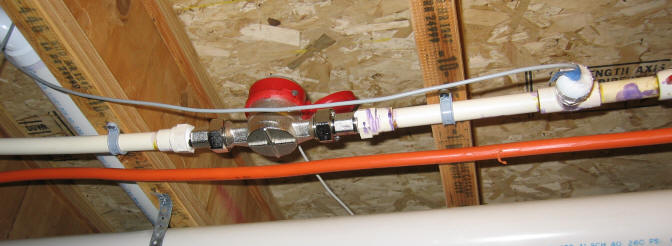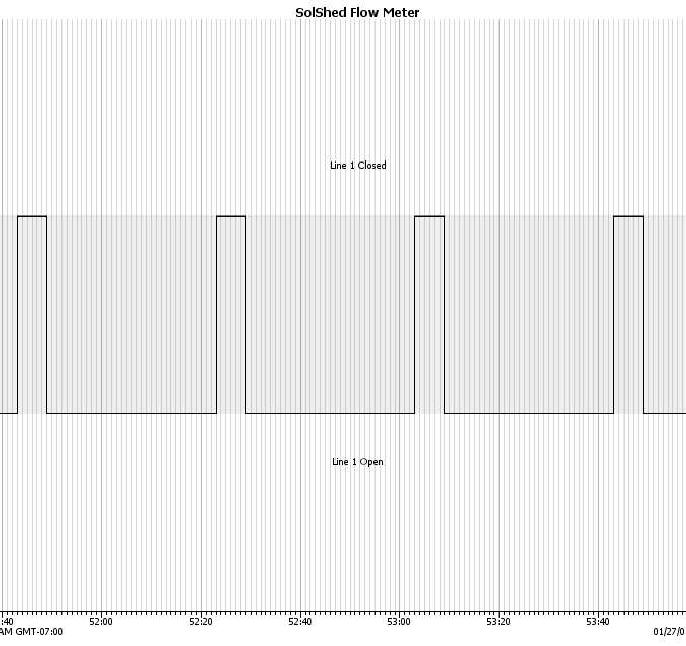
Search
The Renewable Energy site for Do-It-Yourselfers
Using the DLJ
Water Meter for Flow Measurments
|
I have been using a DLJ water meter
from the Daniel L. Jerman Co. (
http://www.jerman.com/ )to
measure flow rates and flow quantities for my Solar Shed house heating project
-- I thought I would pass on what I have learned to date.
The water meter is in the pipe that
runs between the outdoor thermal storage tank and the house. It measures
the total flow of hot water from the storage tank to the house. This flow
rate coupled with the temperature of the incoming water and the temperature of
the water returning to tank allows the calculation of the total heat delivered
to the house by the collector system.
In addition to showing total gallons
on the face of the meter, it also has an internal switch that closes briefly for
each gallon of flow. These switch closures can be monitored by a suitable
data logger, and used to calculate flow rates and total flow over an interval.
The prices for the DLJ meters start
around $50. The hot water capability and the pulse output capability cost
extra. The 3/4 inch one I bought (the DLJSJ75CH) was $120 with the hot
water and pulse output options.
|
|
What's to like about the meter:
-
Low flow resistance
-
Registers total gallons down to the
nearest 1/10th gallon
-
Has a spinner dial that does one
full rotation per tenth of a gallon
-
Hot water capability
-
Appears to be well made
-
Pulse output for logging
Not to like:
-
There are some mounting position
limitations on some of the meters
-
You cannot reset the meter total to
zero

The odometer gives total gallons,
with the last dial being tenths of gallons. The red dial spinner wheel
rotates one full revolution for each tenth of a gallon -- timing a couple of
rotations of this allows easy calculation of the current flow rate. The
metal fittings in the picture come with the meter, and adapt it to a standard
3/4 inch pipe thread.

The meter installed in the incoming
hot water line. The T and stub to the right of the meter is the
temperature sensor (thermistor) for the Onset data logger. A ball valve is
installed just to right of this to allow easy removal of the meter. Note
that the position of the pipe, and the fact that the meter face must be up makes
it necessary to read the meter with a mirror -- not a big deal, but a little
inconvenient.
Logging By Hand:
When logging the flow rates by hand,
I note the total meter gallons at the start of the session. During the
session I calculate flow rates by counting the time it takes the red pointer to
make 10 rotations (1 gallon). At the end of the session, I note the total
gallons again.
You could also just count the number
of full and partial rotations the red dial makes over one minute, and divide
this count by 10 to get flow rate in gallons per minute -- e.g. it the redial
goes around 12 full rotations, and is half way through the 13th in one minute,
the the flow rate is (12 + 0.5)/10 = 1.25 gal/minute.
Logging with the Pulse Output:
The meter has in internal switch
which closes for a brief time for each gallon of flow. The switch contacts
are brought out to two wires. A data logger that can detect switch
closures can be used to record the closure for each gallon.
I use the Onset Computer U12 Event
logger to do this. The output from the logger looks like this:

In this case, the pulse is coming
about every 40 seconds, indicating a flow rate of 1/(40)/(60)) = 1.5 gpm.
The switch stays closed for what
appears to be about 15% of the time to the next pulse. Depending
your logger, this may require a little program to process the recorded pulses
and turn then into flow rate values.
Heat Flow Calculation:
The total heat flow to the house can
be calculated for any given minute as:
Heat Flow = (Flow Rate ) (Tsupply -
Treturn) (Specific Heat of water)
For example, with a flow rate of 2
gal/min, Tsupply = 110F, and Treturn = 95F, the heat flow is:
Heat Flow = (2 gal/min)(8.3 lb/gal)
(110F - 95F) ( 1 BTU/lb-F) = 249 BTU/min or 14950 BTU/hour
Gary 1/28/07



